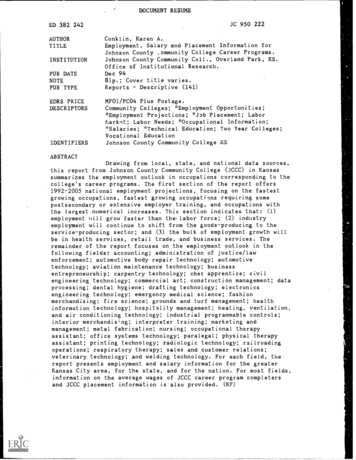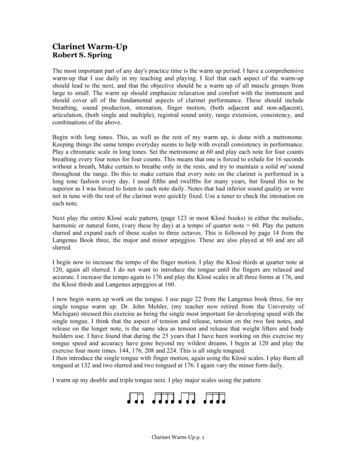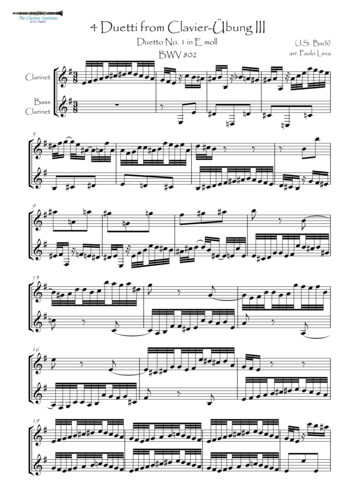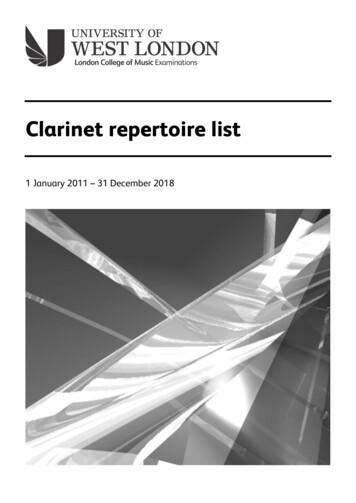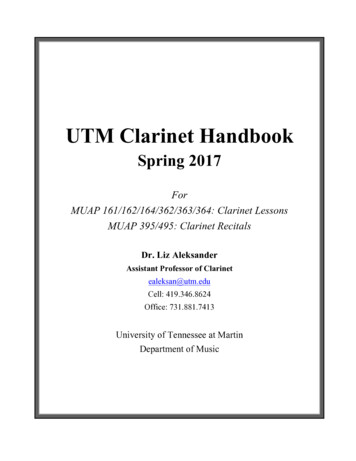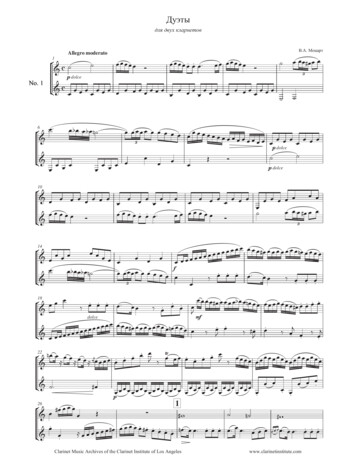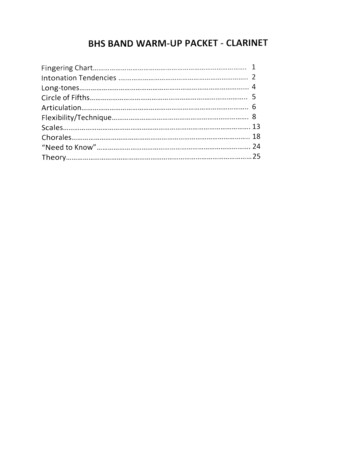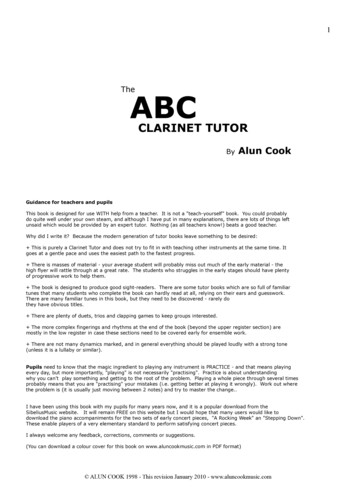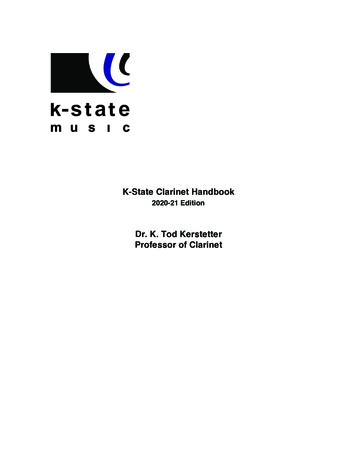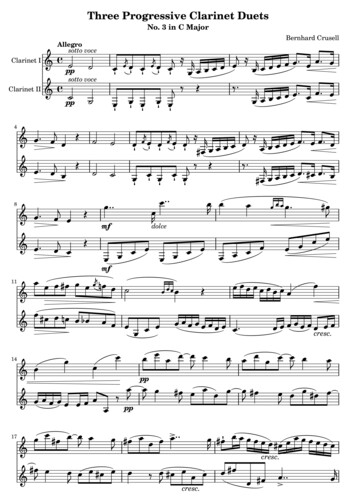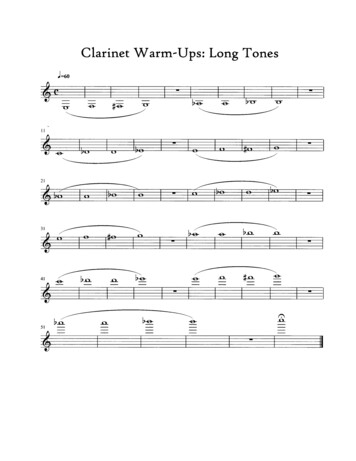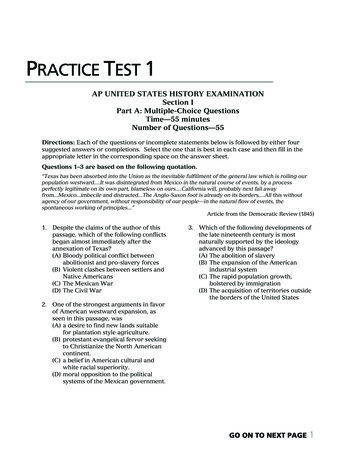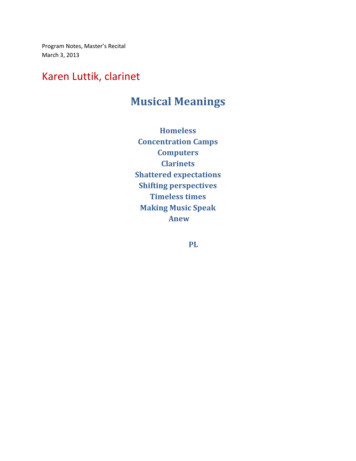
Transcription
Program Notes, Master’s RecitalMarch 3, 2013Karen Luttik, clarinetMusical MeaningsHomelessConcentration CampsComputersClarinetsShattered expectationsShifting perspectivesTimeless timesMaking Music SpeakAnewPL
Musical Meanings:Notes from Karen about this eveningThis recital is an experiment in exploring connections made by the performer and listener, making“concert hall” music more relevant to daily life. Hopefully, people who don’t usually find themselveswithin these walls will receive something of value and personally meaningful.“If I Could Start Again”, the title for the first piece caught my attention. Inspired by the song “Hurt”from the 1994 album The Downward Spiral by Nine Inch Nails, this piece for unaccompanied clarinetwas created at a thoughtful and reflective time in composer Jeremy van Buskirk’s life.This music portrays for me the relevance of music to everyday life. Lyrics from the song read:“If I could start again,A million miles awayI would keep myselfI would find a way”This piece serves as an ideal introduction to the evening. What would happen if we as musicians could‘start again’ and revitalize the traditions seemingly set in stone in Concert Halls?What would happen if that part of music which so moves us to tears in the movie theater could becreatively harnessed and directed in the way we ‘do’ classical music today? The result?Possibly . audiences might come who have never before been in any concert hall? new connections might be made between music and life? new possibilities might pop up for musicians in today’s world?In this recital I hope to experiment with some slightly out of the box ideas. The clarinet is particularlysuited for that; it’s wildly versatile with a huge range both tonally (nearly 4 octaves) and dynamically.Composers frequently draw upon these extremes and the clarinetist’s ability to do huge leaps and fastpassagework to create highly engaging and intriguing works with a variety of moods and meanings.I’m curious for your feedback! The sheet you received is for that purpose. Please jot your ideas down atany time this evening; I’ll be interested to read them.Thanks for your participation!
“How Was it we Were Caught?” composed by Sam Beebe (2012) for Clarinet and computer was theresult of a semester project in Ken Radnovsky’s Woodwind and Brass Seminar class in which studentscommission an original piece.Sam was inspired by the realistic portrait of carpetbaggers in the book, Let Us Now Praise FamousMen by James Agee (with photos by Walker Evans). He and Karen served lunch at the Rescue Missionin Nashua, NH and recorded the stories of some of the people there. Surprised that people would beinterested, they all gave their permission for these recordings to be woven into the fabric of this piece.Hoping to raise awareness of the plight of these people in our society, Sam shows the complexities ofthese lives in the musical lines of the Bb, Eb and basset clarinets as well as computer effects.The libretto is on the back pages of these program notes.Many thanks to Tim, Gerry, Kalik and Dan for sharing their stories with us and to the Southern NewHampshire Rescue Mission for their support of this project.The word “Set” in Set for Clarinet by Donald Martino (1954) refers to a dance band set in which 3movements are played together without pause. Titles were originally given to the three movements:Conservatory Stomp, Blues in Eb, and 10th Avenue Shuffle. This piece was originally intended to be partof a collection entitled Solo Pieces to be Played in Public, Hint!Martino, a clarinetist himself, composed this piece in three days (February 7 – 9, 1954) for his clarinetistfriend and friendly ‘rival’ Arthur Bloom who premiered the piece 3 months later in Princeton. Martinohad studied extensively as a teenager with an Italian clarinetist, Francesco Lieto, who spent hoursteaching him Italian style etudes and operatic passages full of leaps and drama. Martino refers himselfto these pieces as “an instance of classical virtuoso writing in the Italian tradition”. The technicalchallenges in this piece derive directly from Martino’s etude studies with Lieto. Martino had a hugesense of humor; one look at the first line of this piece will convince any clarinetist of that! In fact, thewhirlwind like at the beginning is Martino’s imitation of Bloom’s typically ‘noodling’ warm-up!The visuals accompanying “Set” were made by 7th graders in their art class while listening and beinginspired by the musical ‘noodling’ of each movement. Many thanks to Peg Anderson and the 7th gradersfor their enthusiastic participation in this project.Intermission“Without Jews” (1946), a Yiddish poem by Jacob Glatstein (1896-1971) translated into English byCynthia Ozick is read tonight in both languages by Wellesley College Professor, Lawrence Rosenwald.Yiddish was a language nearly completely eradicated during the Holocaust; these readings vividly set thestage for the following piece and accompanying visuals.Oliver Messiaen met clarinetist Henri Akoka for the first time in a French town, Verdun. Henri, anoutgoing and funny fellow, prodded Messiaen to write something for him. Since Messiaen loved to
make early morning walks in the fields, listening to the birds, he incorporated their songs into his firstpiece for solo clarinet called Abyss of the Birds. Henri Akoka first sight read through this piece in 1940 inan open field near Verdun where he and Messiaen were temporarily being held by the Germansultimately on their way to Stalag VIIIA in Görlitz, Germany. Here, as Prisoners of War, Messiaen andAkoka premiered the complete Quartet for the End of Time; the solo clarinet movement being one of 7movements for cello, clarinet, piano and violin. Messiaen composed this piece(during his imprisonmentin Stalag VIII) referring to the ”End of Time” as he understood the apocalyptical events referred to inRevelations 10. He also musically expressed his forward thinking regarding the “End of Time” of ‘normal’musical restrictions. He went ‘out of the box’ with key, time signature and regular meter, ending‘regular musical time’. Messiaen included the following quote in the original score:The abyss is Time, with its dreariness and gloom. The birds are the opposite of Time; theyrepresent our longing for light, for stars, for rainbows, and for jubilant song!The visuals accompanying this piece represent my understanding of the piece and its creation during theapocalypse that was a Nazi prison camp. Many thanks to the Hebrew Union College Museum, theJewish Press, Atlantic Union College, for granting permission to use these images.Time Pieces, by Pulitzer Prize winning composer, Robert Muczynski (1983), was dedicated tocommissioning clarinetist Mitchell Lurie. First performed at the Clarinet Congress of the InternationalClarinet Society in London in 1984, this piece has become a standard of clarinet repertoire. Muczynskiwrites about Time Pieces:Technically and musically there is a quite a lot going on in this four movement suite, and muchof the time both instruments share the action equally. The music is made up of a number ofelements: energetic, syncopated rhythms, long and sustained melodic lines, cadenzas for soloclarinet, tongue – in cheek humor and an overall ‘up ‘ feeling. For me, the title refers to whenand where I was composing the work, sort of a frozen-in-time idea. However, some listenershave offered their own interpretations as to what I HAD IN MIND . And that keeps things lively.Although Muczynski describes the title, Time Pieces, as having no relation to mechanicalclocks, it is rumored that he had a fascination with clocks and all kinds of mechanical Time Pieces.Muczynski also mentions that the piece is about an “awareness of the fact everything exists in time;history, our lives, and, in a special way, music.”Visuals for this piece were photographed in Nashua NH at Cardin Jewelers, Nashua, NH and at the DavisFuneral Home, Nashua, NH. Many thanks to these businesses for their support of this project! Alsothanks to the C.L. Peterson Studio for granting permission to use prints from the artist’s MemoriesCollection for this performance.Karen wishes to thank her clarinet teachers present and previous for their musical wisdom through theyears! Charles Russo, George Pieterson, Michael Wayne, Jonathan Cohler, and of course Jorge Montilla!
LibrettoHOW WAS IT WE WERE CAUGHT?by Samuel Beebe1.I. PrologueTIM: I grew up in Nashua.GERRY: When I turned eighteen, I joined the carpenter’s union in Boston.I worked on one job - they made me the foreman.TIM: We used to do some big commercial jobs.I used to run a crew, down in Lowell.GERRY: I’m a carpenter, always will be.TIM: Went out to Rhode Island, this and that, ya know, big commercial rubber jobs.GERRY: All I did was read blueprints, snap a light, and tell people what to do.TIM: That was good money.GERRY: That’s all I did for forty years.TIM: I was born in Nashua.KALIK: I’m going through a little bit of things right now.I’m trying to make it, you know what I’m saying?Trying to take care of myself I wasn’t really looking at things.I wasn’t really caring too much about myself I did care about myself but not like that.I wasn’t thinking that nothing special was gonna happen to me or nothing likethat.II. You Learn Only from the StreetsDAN: It was a really long road to get there.I mean, I’ve been going in and out of jail since I was fourteen years old.But I mean, before that, it was lonely.You get used to a lifestyle where you wake up in the middle of the night to breakingglass or screaming and yelling, and running in and trying to help.But I mean, it was a long lonely road –I mean, being a drug addict isn’t, ah – isn’t fun.And it’s, ah, a lot of loneliness.It’s a serious sickness, ya know, when you are going through withdrawals, it’s aserious sickness.It’s like a severe flu that you can’t even sleep through. It’s emotional.You’re left basically alone in the world.And I mean, we’re talking years of this like fourteen years of this on and off.I can see why people make that a lifetime, because you feel like there’s nothing youcan do to get forgiveness from anyone, or there’s nothing you can do to live downthat past. Your family gives up on you – doesn’t believe anything you say.All I wanted to do was be away from my family.And so who’s there to teach you at that point?You learn only from the streets.
2.III. Intermezzo: How was it We Were Caught?TIM: There’s a lot of people out there, ah, on the streets DAN: There’s not a lot of outreach.TIM: that are dying off of heroin right now.We’ve lost probably about four people, five people, just in the past two months.It’s horrible.DAN: They say there’s twenty million Americans that are drug addicts andalcoholics TIM: I don’t see nobody doing nothing about the problems.DAN: and where do they put them? Prison.TIM: They’re too busy building this and building that DAN: Ya know? And it’s a disease.TIM: and nobody’s helping the homeless.DAN: Ya know, my life’s not perfect.TIM: You know, you have homeless kids out there right now, and it’s in December.It’s cold out there.IV. The Foreman and the VeteranGERRY: I used to race motor-cross.A few years ago I moved to Florida.I used to be number two in New England.I stayed down there for about six months.I thought I was gonna die down there.The only person in the state that could beat me was Jimmy Ellis.What I was doing - I was building water tanks.I’m a carpenter.I’ve been a carpenter since I was twelve years old.I had the number two plate.The best thing I did is when I joined the union.I worked on one job; they made me the foreman.I wish I could work.I’m really beginning to hate this.I probably shouldn’t be.Everyone else I talk to thinks I’m lucky.I’m real lucky!I paid for everything!What, you get up in the morning, what do you do?Go to the soup kitchen, have breakfast?Then what do you do?
3.TIM: Yeah, so ah Times have been pretty rough.Now I’m having a sincere drinking problem.A few people help, here and there.A lot of people just sit there get a job.Well, you know what?I try to get a job.After I leave here, I gotta go out to the street corner, and pan-handle.Beg people for money.I’m a nice guy.“Can we talk to you?” I’m like,“Sure, what’s up guys?”“You pan-handlin’ over there?”“You guys know I’m homeless right now.Treat everybody with respect.You guys know I’m always polite to everybody.You guys know I’m a veteran.”Doing the best I can.“Empty your back pack – dump it out all over the ground.Put your hands on the trunk.”One time they told me,“Well, you were in the military?”You guys know this.”Trying to survive.“You know what?That makes you a coward.”“That makes me a coward?”“You guys wouldn’t have, ya know, the guts to do what I did.And now you sit and harass me because I’m out – down and out.”That’s ridiculous.Some of ‘em will give you a hard time.So times are rough.And, ah, I don’t know, ah, what are you gonna do right?GERRY: What I really miss, is – there used to be a track in Pepperell.They dug it up and built apartment buildings.That used to be the best track in New England.And they messed it up by building houses.Ah, that was the nicest track.I used to love that track.
4.V. EpilogueDAN: Basically, my story was: a long road without love – at least I didn’t feel it.KALIK: Something showed me a little something.DAN: When my children came along, ya know, I seen that I was a good person.KALIK: Like a little light.DAN: And I, I felt love.KALIK: A beautiful light.DAN: And from that love, it gave me reason to change.TIM: Anything you can do to try to make a difference – what not?DAN: And that’s what a lot of people need is. Love.Or somebody that cares – to get them to care about themselves, you know?KALIK: It’s getting better though.DAN: I mean, like I said, it was like a miracle.The way the walls were torn down around me.To get out to have this opportunity to live this down.KALIK: That’s all I have to say
Muczynski writes about Time Pieces: Technically and musically there is a quite a lot going on in this four movement suite, and much of the time both instruments share the action equally. The music is made up of a number of elements: energetic, syncopated rhythms, long and sustained melodic lines, cadenzas for solo clarinet, tongue – in cheek humor and an overall Zup Z feeling. For me, the .
